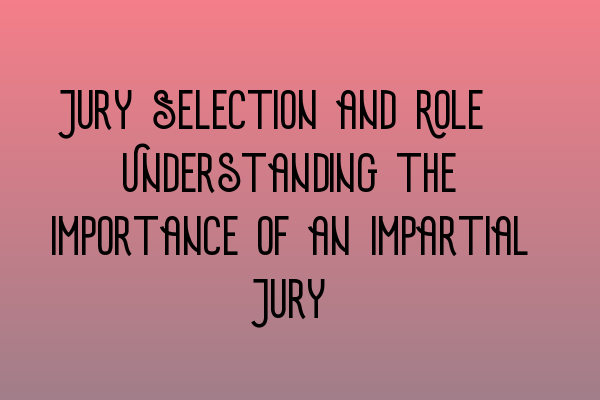Jury Selection and Role: Understanding the Importance of an Impartial Jury
Welcome to SQE Criminal Law & Practice Law UK. In this blog post, we will discuss the importance of an impartial jury and the process of jury selection in criminal trials. A fair trial is a fundamental right of every individual, and a key element in ensuring a fair trial is the presence of an impartial jury.
The Role of a Jury
A jury is a group of individuals selected from the general public that is responsible for deliberating and deciding the outcome of a criminal trial. The jury’s role is to carefully consider the evidence presented in court and determine the guilt or innocence of the accused based on the facts and the law.
Their decision is meant to reflect the views of society as a whole and ensure that justice is served. A fair and impartial jury plays a vital role in upholding the rule of law and maintaining public confidence in the criminal justice system.
The Importance of Impartiality
Impartiality is a fundamental principle in the jury system. An impartial jury is one that is free from bias, prejudice, or preconceived notions about the case or the individuals involved. It is crucial to have a jury that can objectively assess the evidence and make a fair decision based solely on the law and the facts presented during the trial.
Without impartiality, the integrity of the trial process would be compromised, and the accused would not receive a fair trial. It is the responsibility of the court and the legal professionals involved to ensure that the jury is impartial and free from any external influences that could impact their ability to make an unbiased decision.
The Process of Jury Selection
The process of jury selection, also known as voir dire, is a crucial step in ensuring an impartial jury. During this process, potential jurors are interviewed, questioned, and assessed to determine their suitability to serve on a jury. The aim is to identify any biases, conflicts of interest, or personal circumstances that may affect their ability to be impartial. This process helps both the prosecution and the defense parties to eliminate any potential jurors who may be biased or incapable of rendering an unbiased verdict.
It is important to note that not all individuals are eligible to serve on a jury. Certain criteria, such as age, citizenship, and criminal record, may disqualify individuals from jury service. The aim is to select a cross-section of the community that is representative of society as a whole.
Conclusion
An impartial jury is the cornerstone of a fair trial. It is essential to ensure that the jury is free from bias and can make a fair decision based solely on the evidence presented in court. The process of jury selection plays a critical role in achieving this goal and maintaining public confidence in the criminal justice system.
At SQE Criminal Law & Practice Law UK, we are dedicated to upholding the principles of justice and fairness. If you have any questions about jury selection or criminal law, please feel free to reach out to our team. Also, don’t forget to check out our related articles:
